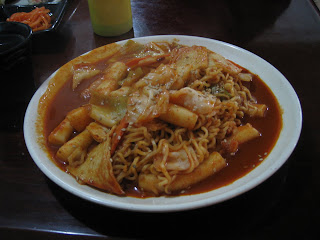One of the things I have not touched upon in this blog (yet) is the confusion local Chinese have with regard to my American identity. In the past, it was frustrating (and still is to a certain extent), but I have found that this puts me in a position to experiment. This allows me to find out how people view me when they believe I do not speak a word of Chinese.
For example, on the train with my two American friends (for this purpose, I must mention that they are both Caucasian males), we pretended that I am originally from the Philippines and cannot speak Chinese because my great-grandparents migrated to the Philippines. For the locals, it was highly ironic that I had two white males translating for me.
When I had a conversation with a few Chinese youths, they said that they would not believe me if I were a stranger and said I am American. Their reasoning is, verbatim, “The blood flowing through your body is Chinese.” I’m still trying to figure out what this means exactly. Is it because this culture is very appearance-oriented, and, more importantly, that it only began its Open Door Policy (1978) not too many decades ago. To the Chinese locals, “American” equals “white.”
On the positive end, these encounters make me appreciate even more my home in the states and reaffirm my pride as an American citizen. For lack of better words, I have to constantly be vigilant about supporting my identity as an American.
Below are a few humorous anecdotes:
#1
While on a bus with my two Caucasian male friends and conversing in English, I heard the Chinese girl sitting next to me tell her boyfriend, “Oh, I used to want to be a translator! I should work harder to improve my English.” My friend subsequently told her in Chinese, “She is not our translator. She does not speak Chinese…she is from Manila. We translate for her.” It took her about a minute to absorb what had happened!
#2
While climbing a mountain with my two Caucasian friends, one Chinese boy exclaimed to his friends, “Look at those [my friends] foreigners! They’re probably from Russia (as Yanji is very close to Russia).” My friend turned to them and said in Chinese, “Where are the foreigners?” One of the boys who was about to gulp down water regurgitated it all. Then they quickly ran off giggling.
#3
While walking around with one of my friends in a village, we came upon a wedding ceremony. The villagers quickly gathered around us (as my friend may be the only foreign-looking individual in the entire area) and invited us to their dinner celebration. One elderly man asked me, “Since you live in the states, are you mixed?” Not giving me a chance to reply, a lady said, “Of course she’s not mixed! You can tell by just looking at her.” They ended that conversation by asking if my friend and I are a couple. In China, the language is tricky when it comes to introducing friends. For example, “friend” can mean “boyfriend/girlfriend.” Thus, it is safer to introduce friends as colleagues.



















